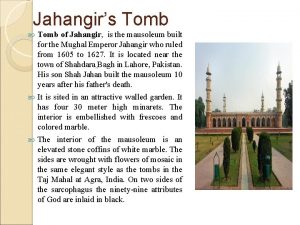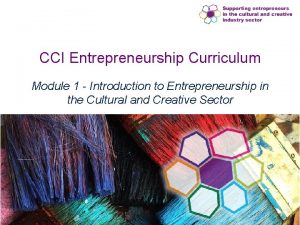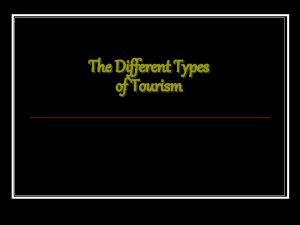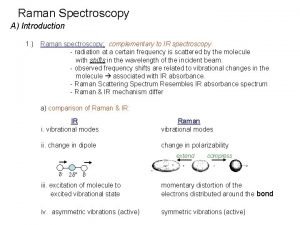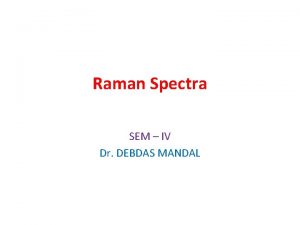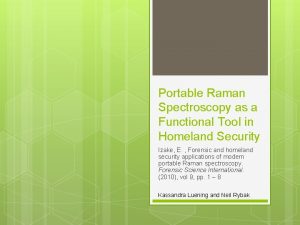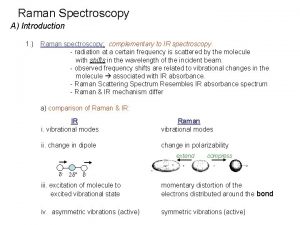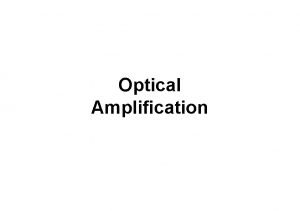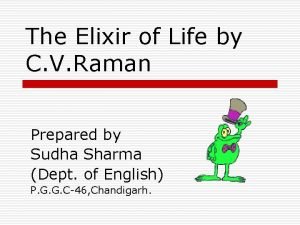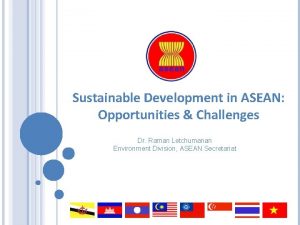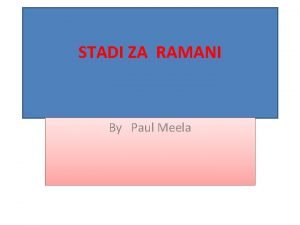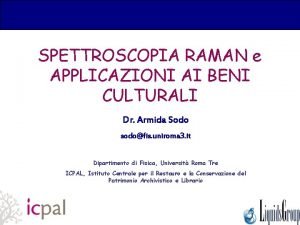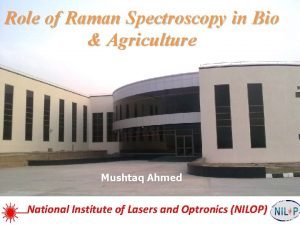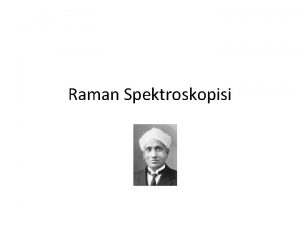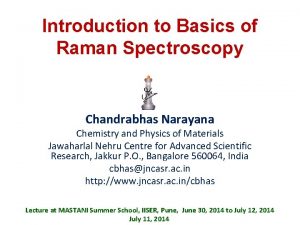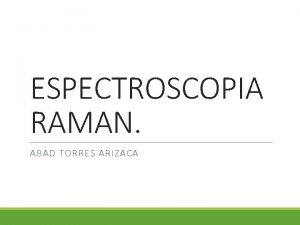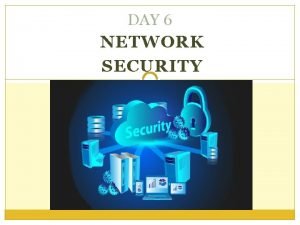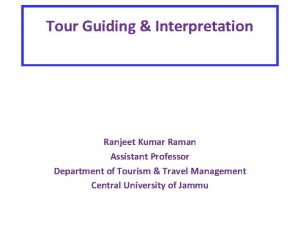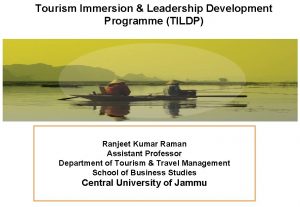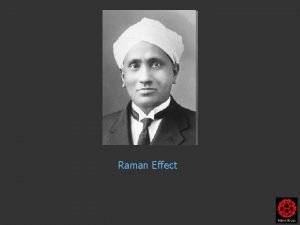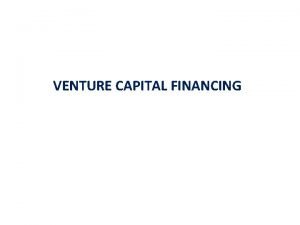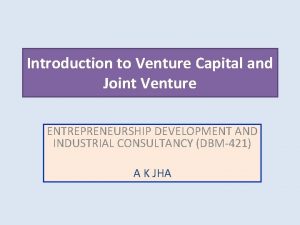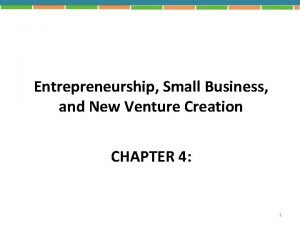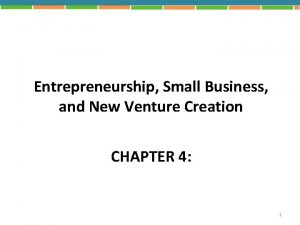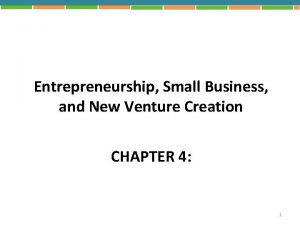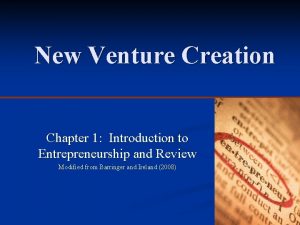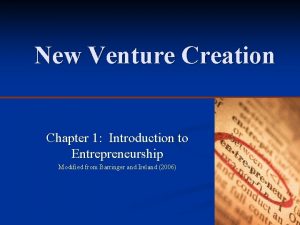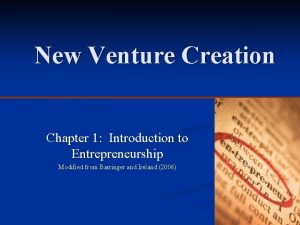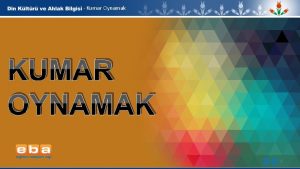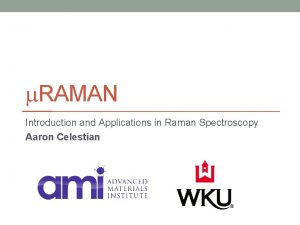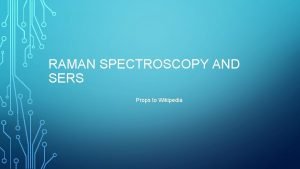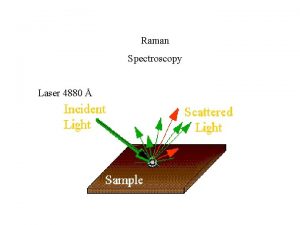Tourism Entrepreneurship and Venture Creation Ranjeet Kumar Raman
















- Slides: 16

Tourism Entrepreneurship and Venture Creation Ranjeet Kumar Raman Assistant Professor Department of Tourism & Travel Management School of Business Studies Central University of Jammu

Course Objectives § The major emphasis of the course will be on creating a learning system through which MBA (TTM) students can acquaint themselves with in-depth appraisal of topics in the Entrepreneurship & New Venture Creation and special challenges of starting new ventures and introducing new product and service ideas in tourism and allied sectors. § To instil a spirit of entrepreneurship among the students participants. § To provide a holistic overview on the competence needed to become an entrepreneur. § To develop necessary knowledge and entrepreneurial skills among the students. § To give insight into starting new venture in tourism and allied sectors.

Feasibility Study : Testing the Idea “The best way to predict the future is to create it”. ‘Idea and dream become reality when they are put on paper, else the remain forever as idea and dream. ’ Verification Illumination Incubation Preparation Idea

Feasibility Study § A Feasibility Study(FS) is an analytical tool used to determine the viability of certain Idea. § It is a tool that systematically explores whether a given idea will work and whether it should pursue further for implementation. § Systematic evaluation is done based on information required regarding various resources that go into the undertaking associated with certain idea.

Use of Feasibility Study § § Introduction of new business The adoption of new method Change in organizational structure Adoption of new technology

Advantages of Feasibility Study § It is means for determining the valuable resources for undertaking(e. g. money, time and manpower etc. ). § It reduces potential risk of failure for a venture. § It allows identification of critical issues and critical resources in un undertaking.

Purpose of Feasibility Study § To evaluate the profitability of a new venture § To evaluate benefits to be gained in the expansion of a business. § To understand the financial impact for changes in business location § To evaluate the benefits from new methods of production, technology or machinery. § To evaluate changes in an organization § To evaluate benefits from business M & A

Characteristics of Feasibility Study ART A = Accuracy R= Reliability T=Timeliness

Components of Feasibility Study Market Feasibility Production/ Technical Feasibility Organizational/ Management Feasibility Financial Feasibility

Market Feasibility § Description of the industry that relates to products or services that you want to produce. § The purpose of MF is to get detail information about the market in order to devise plans and strategies. § Market Research (MR): § MR is means of acquiring accurate and realisable information and knowledge about market. § MR research tool e. g. Survey, Questionnaire, interview, FGD, Media Houses, Advertisements and internet, etc.

Market Feasibility § Market Research Information: 1. Market Information 2. Product Information 3. Organization & Manpower Information 4. Financial Information 5. Government Initiatives

Production/ Technical Feasibility § § § § § Technical Feasibility : Is it technically possible to create the tourism product that you are planning ? Are there any hurdle ? Simple description of what you propose to do. Whether the product or services are ready to sale ? If not how far has it been developed ? What steps you can take to protect your product and services ? The benefit or solutions that customer will gain by purchasing your product or services. The major weakness in your product or services and the ways you propose to overcome them. The resources : equipment , material inputs, technology required to provide your products or services.

Organizational/Management Feasibility § Discuss the structure of the organization of business and justification for such a structure. § Duties and functions of the different position in the structure. § It describes how the different human resources and their activities will operate in an efficient and effective manner and the coast involved.

Financial Feasibility § The amount of money required in the realization of the project. § Source of financing. § Cost involved. Key Concepts: § The Balance Sheet § The Income Statement § Cash Flow Statement

Format of Feasibility Study: Format • • • Executive Summary Introduction Market Feasibility Technical Feasibility Management Feasibility The Socio-Economic and Environmental Impact • Conclusion

Reference § Chowdhary, N & Prakash, M (2010). Managing A Small Tourism Business, Matrix Publication, New Delhi § Danilo L. Fonollera(2009). Feasibility Study, Project Proposal and Business Plan published by Western Mindanao State University, Zamboanga city. § Vasant Desai (2014). The Dynamics of Entrepreneurial Development & Management. Himalaya Publication House
 Jahangirs tomb
Jahangirs tomb Entrepreneurship module 1 introduction to entrepreneurship
Entrepreneurship module 1 introduction to entrepreneurship Mass tourism vs alternative tourism
Mass tourism vs alternative tourism Why are raman and ir complementary
Why are raman and ir complementary Difference between ir and raman spectroscopy
Difference between ir and raman spectroscopy Portable raman analyzer for hazmat and narcotics
Portable raman analyzer for hazmat and narcotics Why are raman and ir complementary
Why are raman and ir complementary Amplification signal
Amplification signal Water the elixir of life essay wikipedia
Water the elixir of life essay wikipedia Awgncb
Awgncb Aina za vipimio vya ramani
Aina za vipimio vya ramani Spettroscopia raman beni culturali
Spettroscopia raman beni culturali Applications of raman effect in daily life
Applications of raman effect in daily life Fizik raman
Fizik raman Low na
Low na Espectroscopia raman instrumentacion
Espectroscopia raman instrumentacion Raman wants to send a few photographs
Raman wants to send a few photographs
